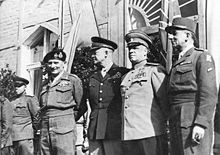One of the key criticisms that Geoff Loftus offers of Dwight Eisenhower’s leadership in Lead Like Ike  is the way that he handled (or failed to handle) Field Marshall Bernard Law Montgomery, the highest ranking British commander in Operation Overlord. Immensely popular with the British public, Montgomery consistently over promised and under produced. He was the architect of the disastrous Operation Market Garden plan, but Eisenhower authorized the effort and took blame for its failure.
is the way that he handled (or failed to handle) Field Marshall Bernard Law Montgomery, the highest ranking British commander in Operation Overlord. Immensely popular with the British public, Montgomery consistently over promised and under produced. He was the architect of the disastrous Operation Market Garden plan, but Eisenhower authorized the effort and took blame for its failure.
Although Loftus acknowledges that Eisenhower was willing to put up with Montgomery in order to accomplish his mission of defeating Germany through an allied effort, I believe that he understands the necessity of keeping Montgomery on as the face of Allied cooperation (and the enormous pressure that Winston Churchill provided as Monty’s advocate). Eisenhower was forced to play the hand he was dealt and hope for some good luck along the way. Toward the end of the war with victory in sight, Eisenhower began to marginalize Montgomery and saw his role as less important once the Allies moved into Germany from the west and the Russians advanced from the east.
Eisenhower’s dilemma is not unusual for those who try to bring together disparate groups and people in order to accomplish a task. Although business consultant Jim Collins talks about “getting the right people on the bus,” we cannot always control who becomes part of our team. This is especially true in church and denominational situations. We might prefer not to have that particularly obnoxious lay leader on the long-range planning team, but he is the church treasurer and the church expects his involvement. The new pastor might not immediately “synch” with the ministers already on the staff when he or she arrives, but they have experience and expertise necessary to the smooth functioning of the church, and the pastor must make an effort to develop a team attitude and good relationships.
The good news is that as the leader gains credibility and confidence in a setting, she or he might be able to move the less cooperative members of the church or staff into areas that make a better use of their gifts or simply “put them out to pasture.” This is done with respect, kindness, and charity, but only with the cooperation of other significant stakeholders in the body.
In the short term, the leader should be thankful that the difficult partner is at least “inside the tent” and try to appreciate what he or she has to offer for the good of the cause. There is always the possibility that the person who does not seem to be a good fit may have insight that is vital to the mission.
 |
| Montgomery, left of Eisenhower (center) |
Eisenhower’s dilemma is not unusual for those who try to bring together disparate groups and people in order to accomplish a task. Although business consultant Jim Collins talks about “getting the right people on the bus,” we cannot always control who becomes part of our team. This is especially true in church and denominational situations. We might prefer not to have that particularly obnoxious lay leader on the long-range planning team, but he is the church treasurer and the church expects his involvement. The new pastor might not immediately “synch” with the ministers already on the staff when he or she arrives, but they have experience and expertise necessary to the smooth functioning of the church, and the pastor must make an effort to develop a team attitude and good relationships.
The good news is that as the leader gains credibility and confidence in a setting, she or he might be able to move the less cooperative members of the church or staff into areas that make a better use of their gifts or simply “put them out to pasture.” This is done with respect, kindness, and charity, but only with the cooperation of other significant stakeholders in the body.
In the short term, the leader should be thankful that the difficult partner is at least “inside the tent” and try to appreciate what he or she has to offer for the good of the cause. There is always the possibility that the person who does not seem to be a good fit may have insight that is vital to the mission.
Comments